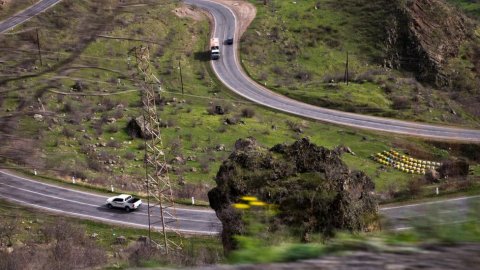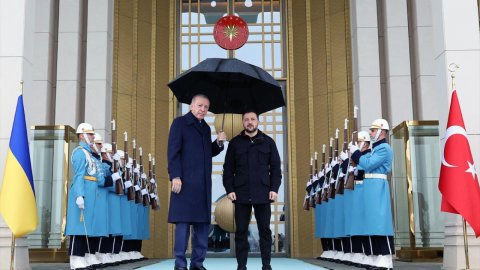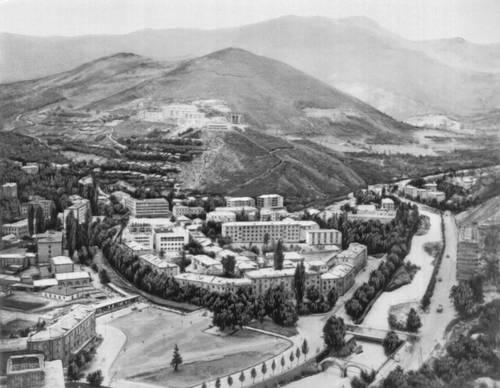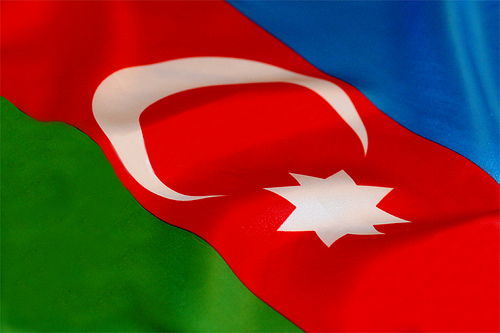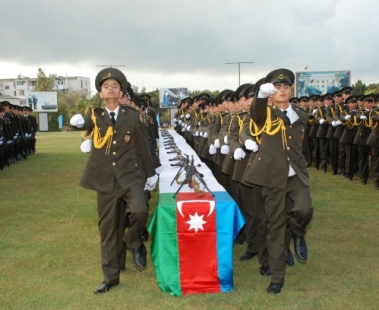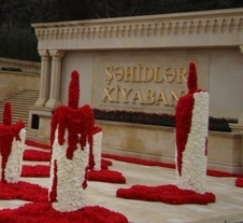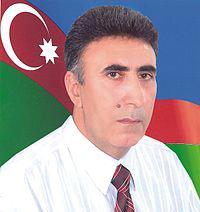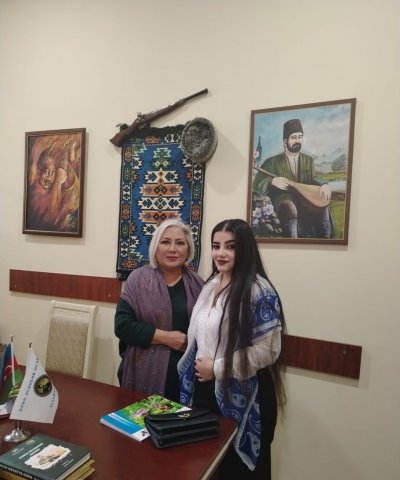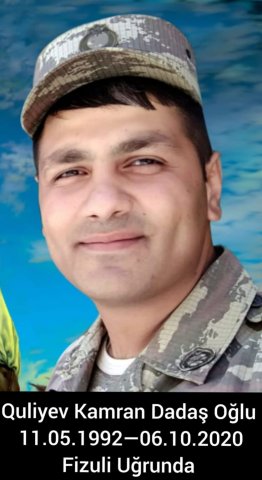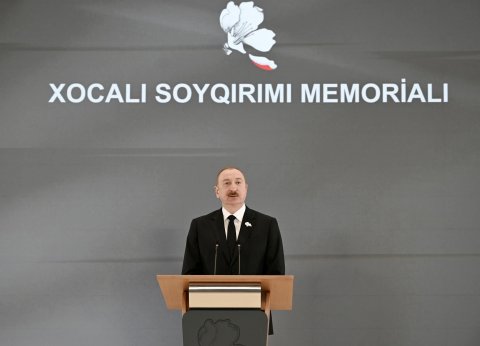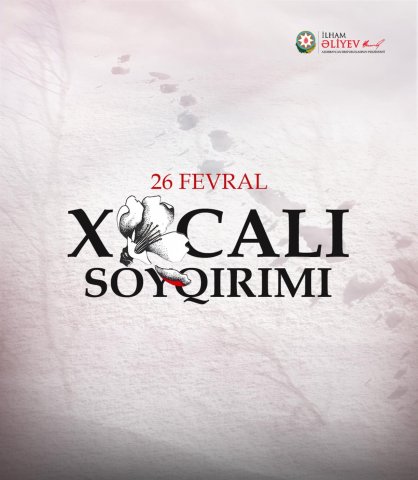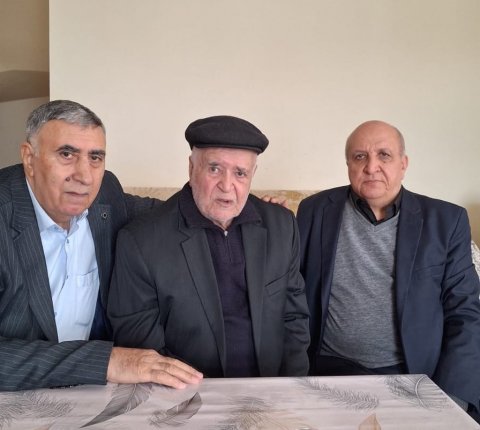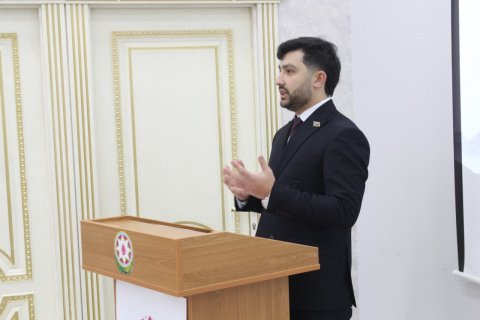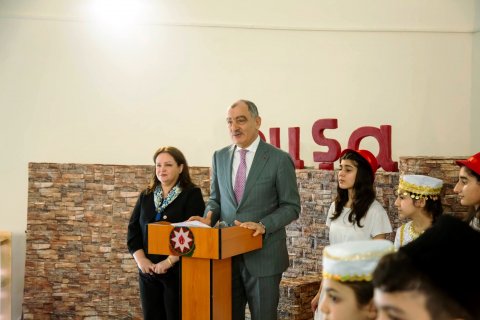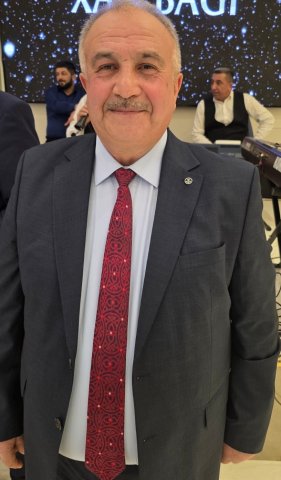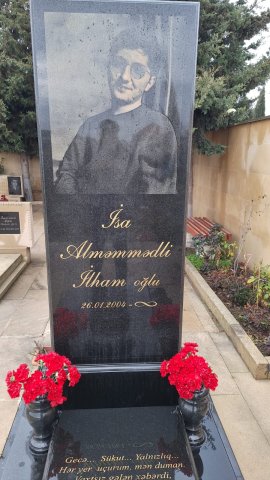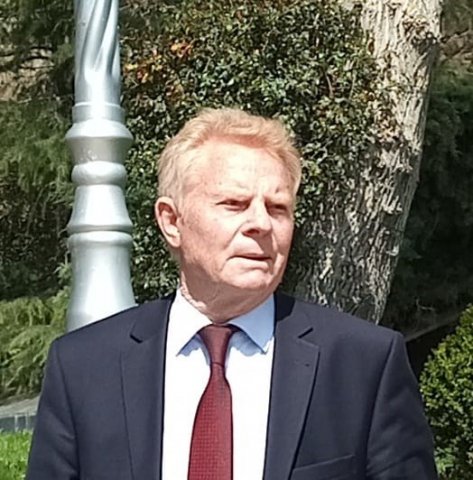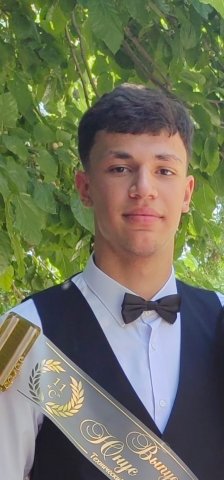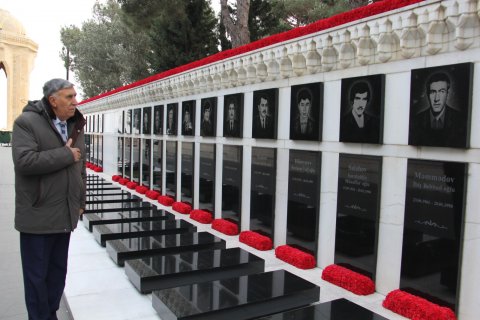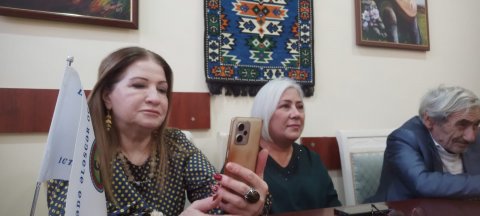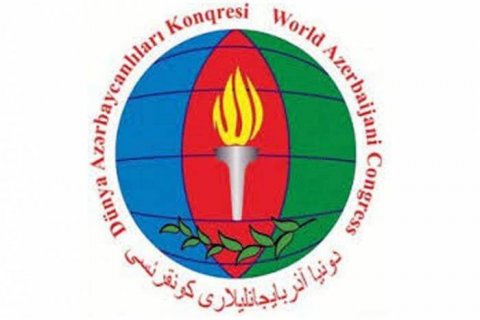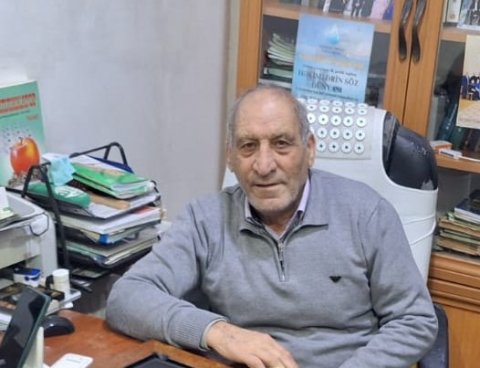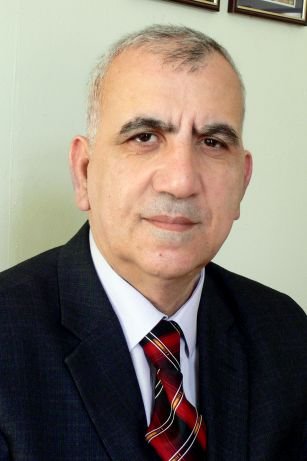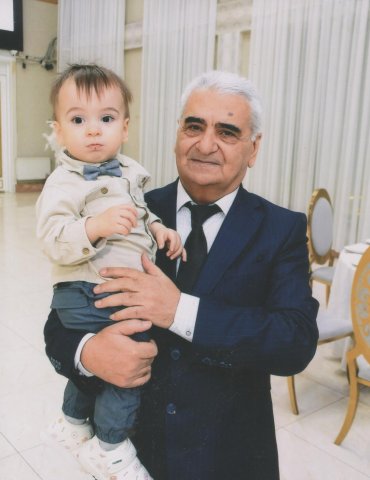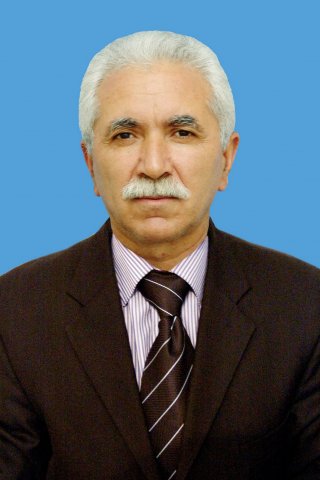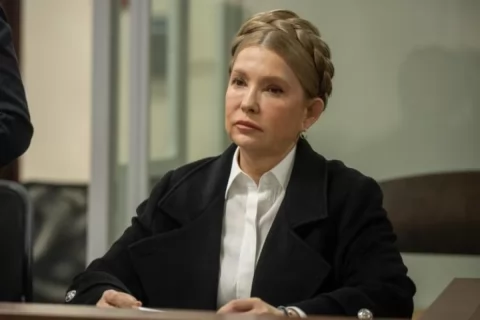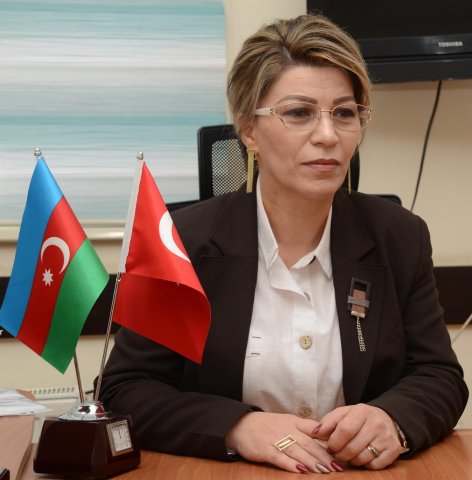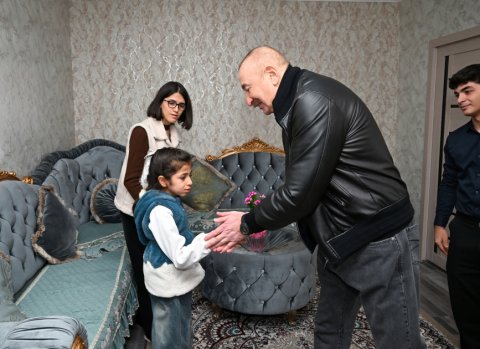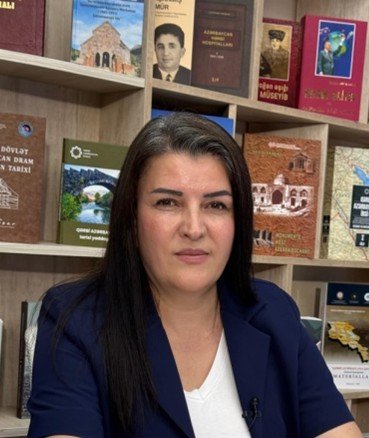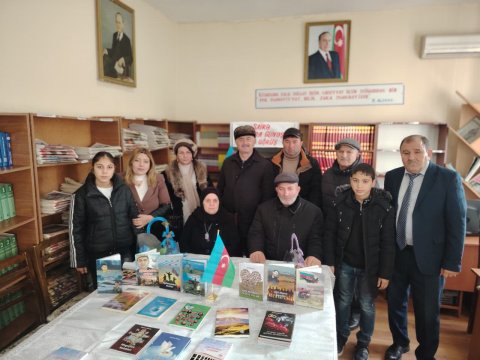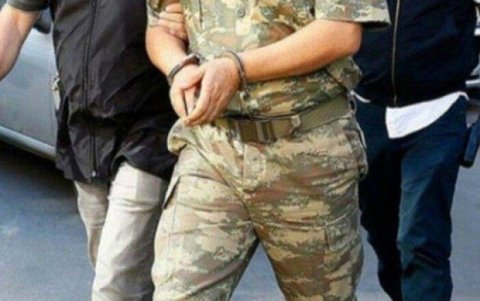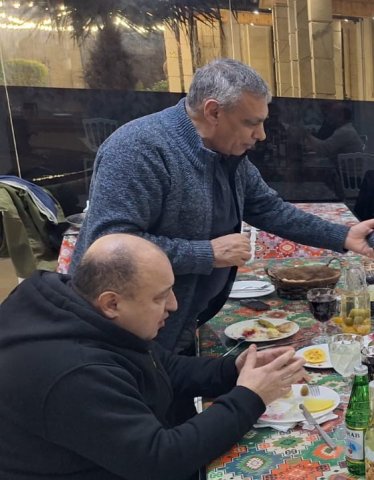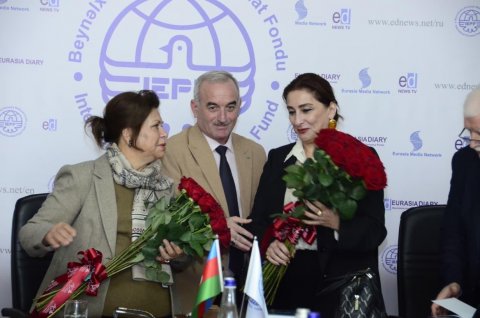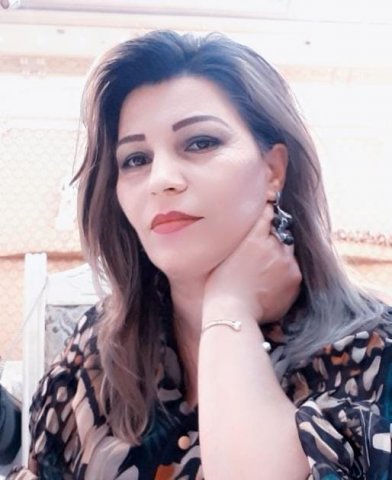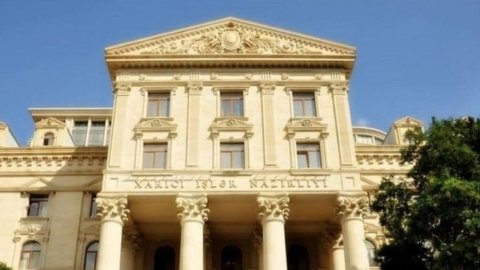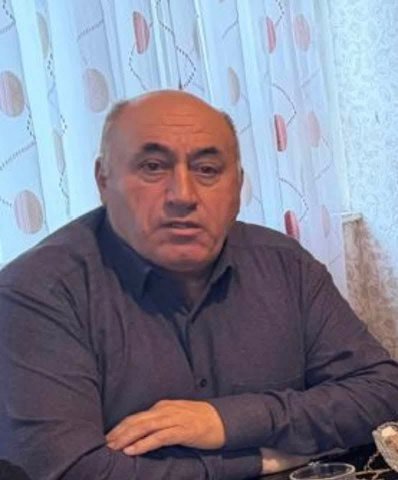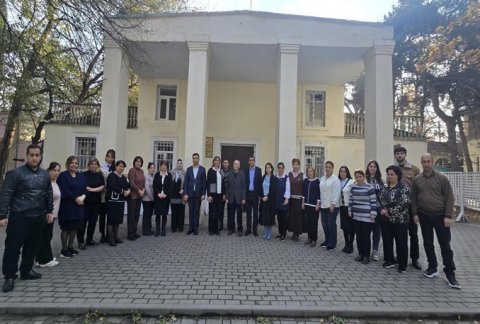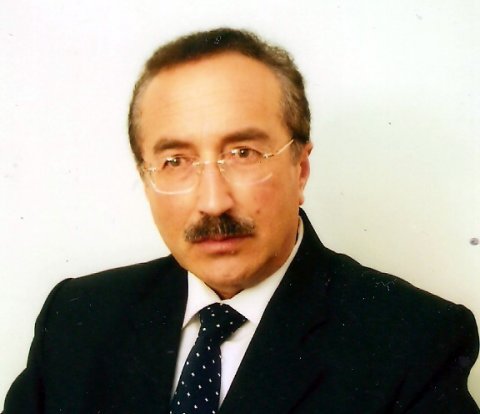
Tarix : 4-01-2022, 12:56
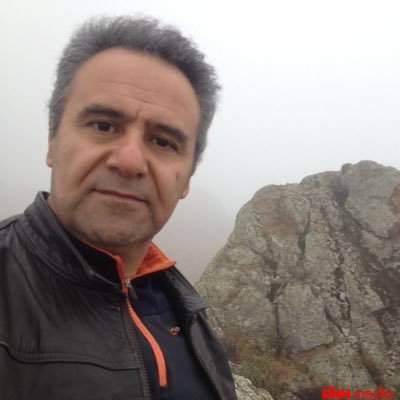
By: Araz Ahmadoghlu
An unexpected pioneering movie became a legend in Iranian movie industry. The man who created this pioneering work is Mr. Hadi Hejazifar, an Azerbaijani screen writer and actor from Khoy.
The star of the movie, Atabay (Hadi Hejazifar), who has studied architecture in Tehran, becomes crazy returning to his homeland and seeing too much disgusting filthiness there. His father is into narcotics, smoking with his friends in a pigsty. Their son-in-law has sold their father land to a Persian businessman because he has already brought up some debts and then he had to pay back the checks. The Persian guy is now running a horse show with his two daughters in Atabay's homeland. In spite of the fact that Atabay's sister, Farroukhliqa loved a boy called Yahya while she was very young, she had been forced to marry a much older man called Parviz. Now they have a son called Aydın. Because she hated her husband, she used to see Yahya secretly. After a while Parviz leaves her alone with her son and starts a new life in another city. Farroukhliqa can't tolerate the burden and burns herself in the middle of the village. Now Atabay's world is his nephew, Aydın.
The young generation in the village is trying to study and leave the village anyway that symbolizes their homeland for the sake of better opportunities. The character in the movie that symbolizes the young generation is Jeyran. She proposes Atabay, who is as old as her own father, to marry and save her from their village. İn oder to run for those fantasies like millions of other Azerbaijani Turks, Atabay has started wandering from his homeland, either. No matter how talented or powerful you are, the megalomaniac ethnicity that consider you as the second or the third degree citizens will always beat you three to zero and block your path toward fulfilling your dreams. In spite the fact that Atabay was always more intelligent and successful in his classes and job, he has never been able to accomplish his dreams because of his Turkic accent and that fact that he was never one of them! The Persian beauty that he had offered her his heart, had deprived him making a home for himself and offered him grey hair instead.
Nevertheless, Atabay falls in love with a second Sima. Why Sima? It is a proper noun for females in Farsi, but literally means “face; appearance”. Therefore, after leaving the rural environment’s boring life and being dropped in the middle of much exciting and eye catching life style of the urban life, the youth such as Kazim (Atabay) fall in love with what looks beautiful and attractive to them and become deprived from the true love. Those who have said: “Love is blind”, in fact, have tried to say that those who are not able to see the true and pure love are blind.
Even if Kazim himself emphasizes: “Kazim is dead! Call me Atabay!”, on another scene he says: “Man never changes”. This paradox, in spite of the literal gratitude of his new name – Atabay – is nothing but only an empty slogan. Therefore, Atabay is carrying “Kazim” within himself. The numbers 21, 31, 41, 51, etc. beginning the movie are repeated exactly at the end of the movie. In spite of changing digits of 2, 3, 4, 5, etc. the never changing number, “1”, remains the same. Even if the rural boy, Kazim, has changed his name to Atabay, his personality and world view have never been able to become Atabay in its literal meaning. In Turkic language “Atabay” is the father-like-master of a prince who not only brings him up, but also is his wise counselor. Regardless of the fact that Kazim is trying to act as his nephew’s atabay, he only is dragging Aydın behind himself. There is an Azerbaijani saying that says a wise man is never gets stung from the same whole. However, the ones such as Kazim will never become wiser even if the get a hundred times. If he was wise enough, he would never hit Aydın so savagely and the started crying in front of him and begging to be excused and forgiven.
The theme of the movie story is the writer’s this attitude toward the same problem. He is trying to depict that if you surrender your heart to a person who has already a prejudiced inferior look on you will never make you happy. Say hello to him if you see such a happy one! The screen writer is depicting this concept through a very influential symbol. Before his guests come, Atabay climbs the hills to collect some thyme for them. But the wind robs the plastic bag out of his hand up to the sky. He stars chasing the empty plastic bag up and down the hills to no avail. It symbolizes chasing happiness and love in vain.
The word “aydın” in Turkic language mean “open-minded; intellectual; pleased and happy”. For example, when saying “” in Azerbaijani Turkic you wish someone to be happy and pleased with his life; and for the other meanings it is used in the word collocations such as “Azerbaijani intellectuals”. However, when the word is written with an upper case initial – Aydın, it is a proper noun for males in the language, literally meaning the first definition. Through the context of the movie the character of “Aydın” is the baby of the family, their most intelligent, their most handsome, who is living in one of the outlying villages of Azerbaijan, writing Farsi poems and falling in love with a Farsi speaking girl called Simin, though. As well as Jeyran, Aydın symbolizes the young generation. Nevertheless, if the intellectuals of a nation are “Aydın” and “Atabay”, then poor the ordinary people of the nation! One of the outstanding critical points of the movie is the pronunciation of “Aydın”. When they use in the exclamations such as “Gözün Aydın olsun!”, they pronounce it correctly. However, when they use the same word as a proper noun, especially the young generation mispronounce it. The reason is the lack of education in their mother language. Both in Farsi and Azerbaijani Turkic the word is written the same way as “آیدین”. It is obvious that its pronunciation with the Farsi accent will be the dominant one, while its original pronunciation in Turkic is /aıdın/.
Considering its beauty, the word “Ceyran” (Jeyran) in Turkic, which is the name of one of the most beautiful species of deer, is given to females in the language. At the same time, it connotes another meaning, i.e., “purity; innocence”, equivalent to “lamb” in Christianity. There is a legend about Imam Riza, who vouches a mother deer to go back to feed her babies and return to the hunter. She returns after a while, and the hunter requests for absolution. In order to endear their beloved ones or daughters the address them as “” in Turkic, which is equivalent to “Darling” or “Honey!” in English. So the name symbolizes both beauty and innocence in Turkic. The character of rural “Jeyran” in the movie is more good-looking than the stylish urban girl, Sima. However, men like Atabay are not capable of observing this beauty. The audience’s cackle at Jeyran’s sincere behavior and simplicity, in fact depicts that those characteristics are no longer the value cult of this society. Then, the youth of such a society with such a world view are forced to either get married too early, secretly meet their ex while they are married, scape from home or finally commit suicide.
Atabay's lost paradise is two things: the garden that Parviz has sold and smoked up the money, and the Urmia lake which is being dried up. Unfortunately, both of them have gone out of Atabay’s reach. Every native one walking on the dried salt of the lake that is threatening the life of millions of people around would say: “Who could believe it once we used to swim here?!” The burden of this statement is completely familiar for all of them. Both Atabay, who has lost his native paradise, and his nephew are looking for love. The thing that they chase and consider as pure love is only a mirage, though.
The story of the movie is written based on a thought originating from national identity. The monuments such as the unique minaret of Shams, historical Bazaar, Mutallib Khan’s palace beautifully depict Azerbaijani architecture, rich history and culture. The Ashiq’s music adds more to it. There is a special attention along the movie on folk games such as “Qayish qoydu” or the belt fight. It is an extremely exciting traditional game among boys in Azerbaijan.
The movie has a relatively good photography and filming. It becomes even more attractive when it is accompanied by the scenic beauties of Khoy and other parts of Azerbaijan. The special leitmotiv of the photography context is the grey and orange colors. The orange color matches well with the seemingly boring rural life style. While the bluish grey color efficiently symbolizes the death of the Urmia lake, especially, the scene in which Atabay and his close friend, Yahya are walking together on the port which is left completely useless there. At the beginning scene of the movie, while Atabay enters to the café of the village, the boys are playing their traditional game of belt fight. At the same time, as a train is passing by the village, its image is reflected on the large window pane of the café. It is obvious that the existence of the train in the movie was not so important for both the photographer and the director. If it were, the camera would focus on the train, then the playing children and the actor entering the café. Even if this scene is accidental, it is one the most conceptual ones. During World War I and II the war lords needed a strategic rail road to carry the Allies’ ammunition behind the front of war with Nazis – the Russian front. But it was only the face of their strategy. Their main goal was to provide the necessary weapons for their local puppets, especially against the Ottoman empire and Turks. They made this rail road with the money and work force of the local people to serve their strategy. Rail road is crucial infrastructure around the world. It is built to carry development and industry to the region. Regardless of passing through Azerbaijan, it has never been useful for its nation! The village depicted in this movie is an alive witness of this theory in the 21st century.
However, there is a terrible problem at the wedding scene. The folk is dancing their traditional Azerbaijani dance, called “Yalli”. The camera has only been focused on the dancers’ heads, though. On the other side, while the ashiq is singing, the cameraman is bringing the singers mouth and his teeth to close-up. This has become a major practiced problem in Iranian television industry. They intentionally remove such a beautiful Saz, ornamented with seashells, from the frame and bring in the clos-up of the poor ashiq’s teeth and nose. Could it be something rather than being afraid of the power of Saz?
The major roles’ – of Atabay, Aydın, Yahya and Simin – acting is great, especially Atabay’s anger, along with Aydın’s pure simplicity arises a familiar sympathy among Azerbaijani and other Turkic audience. The story starts with the narration of the first person and his point of view. Then it shifts to the objective point of view. It is a post-modern realistic story. The suspense starts exactly at the beginning by Atabay as he counts the numbers 21, 31, 41, 51, 61, 71, 81, and come to an indefinite ending by counting the same numbers.
The plot is developing well. However, the dialogues of the movie cannot go beyond the very informal vernacular, maybe because of its setting’s time and place dimensions. The lack of education in mother language is prominently obvious. The characters are plausible and reasonable for the plot. Although, Yahya’s character could be played more naturally if there had been a local accent coach to teach Javad Izzati some vernacular accent. In spite of his good acting, this role is not so successful regarding the context of the movie, maybe because of financial or some other problems.
The Urmia lake’s problem is the to-be-or-not-to-be for Azerbaijan. The screen writer is effectively conveying this problem through his narration. Nevertheless, the special effects at the flamingos’ night scene cannot be considered so good. After the intentional drying of the lake, the artists and literary figures of Azerbaijan have turned flamingo as the symbol of dying Urmia lake to attract the world’s attention to the catastrophic outcomes of the problem. As everywhere of (southern) Azerbaijan Atabay speaks in Farsi with his own nephew while they are by the lake with the two Farsi speaking characters, Sima and Simin. And the ones who have come as guests to another geography with another language and identity are the farsi speaking one. But these are the hosts who speak in the guests’ language. According to the context and setting of the movie there is not so much need for makeup. Only the makeup necessary to show Atabay’s injuries and when falling in the pool Aydın breaks his head look very natural.
The characters’ costumes are selected properly. Atabay’s Cadillac, his western style casual clothes, listening to western music and sometimes to Tatlıses creates an outstanding paradox with the amber rosary hanging from his neck. The character who is living such paradoxes silences the ashiq in the wedding ceremony. However, driving to Yahya’s wife’s funeral he listens to western pop music! It is not an accepted morality among the folk anywhere. But he is trying to arouse his folk’s objection to an extremely bizarre problem. Nevertheless, the people who never question the existence of some red fishes in a lake on top of a mountain are not capable of even making an appropriate objection to an antisocial behavior.
The sound track of the movie could not be considered so successful. It was possible to create a more powerful one. For example, by mixing the local music with the modern world music it could be possible to compose an unforgettable piece of music appropriate for the movie.
Atabay is trying to express the message of the movie through a bizarre scene. He intends to illustrate his friend how to change. “In order to change you have to extinguish the fire within. As long as you have not extinguished it, this fire will burn anywhere you take it.” To illustrate his advice, he takes an old tire to the top of a hill with Yahya. Then they pour gas on it, burn it and push it down the hill. It burns down the path. We hope that the audience would not misinterpret it and would not burn the mountains for the sake of their joy!
The screen writer is trying to depict the main character’s self-attitude through a very meaningful scene. Whenever he wants to contemplate their village, he uses a binocular to overlook at the village. It symbolizes the similar people’s self-attitude and their inferior look at their own society. Such people have always an inferior look at their own village, community and national identity. This attitude is forced by the pressure of the dominating culture and ethnicity. The individuals of those kind of societies will be deprived of the advantages both the suppressed and suppressor society.
We would thank the screen writer and main part of the movie, Mr. Hadi Hejazifar, its director, Ms. Niki Karimi, and its sponsor Mr. Qulamrza Bahari. We would also be honored to wish success and long life for all those lovers of our homeland.
Khoy, 12/12/2021.
Paylaş
Bölmə: Güneyin sesi / Karusel / Slayd / Xəbər lenti
Başqa xəbərlər
- video
- Araz Əhmədoğlu yazır: SENARİSTİN VƏTƏN SEVDASI
- `Orta aylıq pensiya 203 manat olacaq` - Hadi Rəcəbli
- Pensiyaçılara şad xəbər
- Çempionlar Liqasında mübarizə aparacaq “Araz-Naxçıvan” iştirak ərizəsini UEFA-ya göndərib
Fikirlər
Sorğu
Saytımızda hansı mövzulara daha çox yer verilməsini istəyirsiniz?
Son buraxılışımız
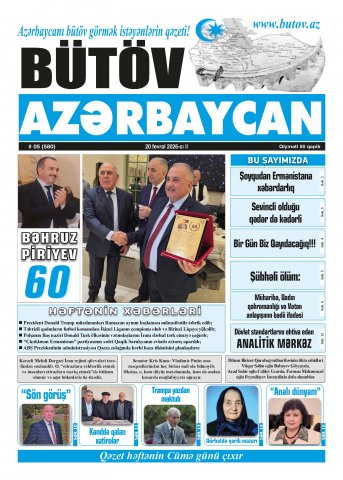
Facebook səhifəmiz
Hava
Valyuta
Reklam

Sayğac
Ən çox baxılanlar
Köşə
Xəbər lenti
Foto

Tanınmış telejurnalist vəfat edib
Tanınmış telejurnalist Nailə Əkbərova vəfat edib.
Bu barədə onun dostları məlumat yayıblar.
O, ağır xəstəlikdən əziyyət çəkirmiş.
Əkbərova Nailə Ənvər qızı 27 avqust 1963-cü ildə Şamaxı şəhərində anadan olub. Azərbaycan Dövlət Mədəniyyət və İncəsənət Universitetinin məzunudur. 1981-ci ildən Azərbaycan Dövlət Televiziyasında çalışmağa başlayıb. 1997-2006-cı illərdə musiqi verlişləri baş redaksiyasında baş rejissor vəzifəsində çalışıb.
2006-ci ildə “Space” telekanalında bir neçə verlişin rejissoru işləyib. 2009-cu ildən TRT telekanalının əməkdaşıdır. TRT Avaz-da yayımlanan “Qafqazlara əsən yellər” proqramının müəllifi, rejissoru və aparıcısı olub. Azərbaycanda ilk klip yaradıcılarındandır.
Allah rəhmət etsin!
Video
"Vətən Qəhrəmanları" Şəhid İlyas Nəsirov
All rights reserved ©2012 Butov.az
Created by: Daraaz.net Wep Developer By DaDaSHoV
MATERİLLARDAN İSTİFADƏ EDİLƏRKĦƏN PORTALIMIZA İSTİNAD ZƏRURİDİR!!!
Created by: Daraaz.net Wep Developer By DaDaSHoV
MATERİLLARDAN İSTİFADƏ EDİLƏRKĦƏN PORTALIMIZA İSTİNAD ZƏRURİDİR!!!




